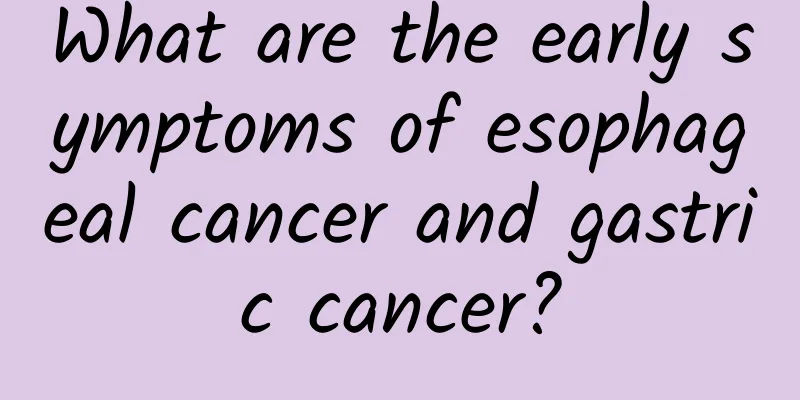What are the early symptoms of esophageal cancer and gastric cancer?

|
Esophageal cancer and gastric cancer are two common malignant tumors. Their early symptoms are not obvious and are easily overlooked. However, understanding the early symptoms is crucial for early detection of the disease and timely treatment. In this popular science article, we will introduce the symptoms and screening methods of early esophageal cancer and gastric cancer in detail to help readers better understand these two diseases. 1. Early symptoms of esophageal cancer 1. Sternum pain, acid reflux and heartburn Patients with esophageal cancer generally do not have any obvious clinical symptoms in the early stages. A few patients will experience burning and pain behind the sternum in the early stages, and a mild sense of obstruction after eating. Early esophageal cancer may cause erosion and shallow ulcers in the esophageal mucosa. When food comes into contact with the area of these lesions, patients may experience pain and stuffiness behind the sternum. Some patients with esophageal cancer may gradually develop chronic esophageal inflammation, and may have symptoms of esophageal inflammation such as acid reflux and heartburn in the early stages. 2. Nausea, abdominal pain and difficulty swallowing Nausea and vomiting are among the more common early symptoms of esophageal cancer. This symptom usually occurs after eating, especially when swallowing hard or rough foods. In addition to nausea and vomiting, early esophageal cancer may also cause abdominal pain. This abdominal pain may feel dull or painful in the abdomen, especially after eating. As esophageal cancer progresses to the middle and late stages, the mass gradually increases, causing the esophageal lumen to narrow, and then the typical symptoms of progressive dysphagia appear. This symptom may resolve on its own without treatment in most patients, but if the symptoms recur or gradually worsen and increase in frequency, it is necessary to highly suspect the possibility of esophageal cancer. 2. Common symptoms of early gastric cancer 1. Upper abdominal pain and weight loss 80% of patients with early gastric cancer are asymptomatic. Some patients may have symptoms of indigestion or only upper abdominal pain and discomfort, which are similar to the manifestations of benign diseases. As the disease progresses, the nature of the pain may change. For example, the initial dull pain gradually turns into persistent severe pain, or radiating pain occurs. This change in the nature of pain is usually related to the growth of the tumor and invasion of peripheral nerve tissue. Due to the growth and metabolism of early cancer cells, gastric cancer patients consume a large amount of nutrients, resulting in obvious but unexplained weight loss. At the same time, gastric cancer may also cause gastrointestinal bleeding, and long-term blood loss can lead to anemia. Patients may experience symptoms such as pale complexion, fatigue, and dizziness. 2. Belching, bloating, and loss of appetite Patients with early-stage gastric cancer may experience gastrointestinal dysfunction at first, manifested as belching, bloating and other symptoms. The gas in the stomach rises and is discharged through the mouth, making a sound. At the same time, due to the growth and compression of the tumor in the later stage, the gastrointestinal motility may slow down, and food may stay in the stomach for too long, causing loss of appetite. 3. Vomiting blood, black stool with blood, abdominal mass When gastric cancer tumors grow to a certain size, they may damage the blood vessels of the stomach wall and cause gastrointestinal bleeding. Patients may experience symptoms such as vomiting blood and black stools. Black stools are caused by gastrointestinal bleeding. If you find symptoms of black stools, you should immediately seek medical attention and undergo relevant examinations to rule out the possibility of gastric cancer. As gastric cancer develops, the tumor may gradually increase in size and form abdominal masses. These masses are usually hard in texture, rough in surface, and fixed. The appearance of abdominal masses usually means that gastric cancer has developed to the middle or late stages. 3. Screening methods for early esophageal cancer and gastric cancer 1. Exfoliative cytology examination This is the preferred method for early diagnosis of esophageal cancer and gastric cancer. Practice has proved that exfoliative cytology examination is feasible for large-scale surveys in areas with high incidence of esophageal cancer and gastric cancer. The overall accurate positive rate can reach more than 90%. The method is simple, the examination is less painful, and the false positive rate is low. 2. X-ray barium meal It is an important method for diagnosing gastric cancer. The diagnostic accuracy rate for mid- and late-stage gastric cancer is over 85%, but the diagnostic rate for early-stage gastric cancer is lower. However, this method can detect changes in the esophageal mucosa, structure, and function at an early stage, and can help to identify esophageal precancerous lesions at an early stage. It is less painful and easy to tolerate. 3. Endoscopic examination Endoscopic examination has become the most reliable method for routine clinical diagnosis, postoperative follow-up, and efficacy observation of upper gastrointestinal diseases (esophageal cancer, gastric cancer, etc.). In early esophageal cancer, the detection rate of endoscopy can reach more than 85%. For high-risk groups, regular endoscopic examinations are recommended to detect and treat esophageal and gastric cancers in a timely manner. Conclusion Both esophageal cancer and gastric cancer are serious digestive diseases, and the identification of early symptoms is crucial for timely treatment and improved prognosis. Early symptoms of esophageal cancer may include sternal pain, acid reflux and heartburn. In the later stages, the condition worsens and there will be difficulty swallowing and coughing. Early symptoms of gastric cancer may include upper abdominal pain, indigestion, nausea, black stools, etc. These symptoms may be similar to other diseases, so if these symptoms occur, you should seek medical attention for detailed examination in time. Whether it is esophageal cancer or gastric cancer, early diagnosis and treatment can greatly improve the survival rate and cure rate of patients. |
<<: Is it good for digestion to go to the toilet right after eating?
>>: What are the common methods of cardiac interventional treatment in cardiology?
Recommend
What is the normal size range of the uterus?
The uterus is a very important reproductive organ...
Can I use anesthesia to fill a tooth? Why does it hurt to fill a tooth even after anesthesia?
In life, as people's eating habits become mor...
How can women nourish their liver and kidneys?
Some older women always feel back pain, frequent ...
How much does the first pregnancy test cost?
We all know that prenatal check-ups are necessary...
Why are my breasts so soft and not firm?
Having a pair of firm breasts must be the dream o...
Female right breast pain
Women often experience breast pain, especially ch...
Why does a woman have back pain and blood in her urine?
Hematuria is a common symptom for us. This sympto...
Brown and sticky vaginal discharge
When the leucorrhea appears brown and sticky, you...
Can the osmanthus flowers used to make osmanthus wine be washed with water? How to deal with the osmanthus flowers used to make osmanthus wine
Osmanthus wine is a traditional specialty wine of...
Can women take anti-inflammatory drugs during menstruation?
Menstruation is a best friend that women know ver...
Can I drink alcohol during breastfeeding?
Nowadays, exclusive breastfeeding is encouraged, ...
What are the dangers of pelvic effusion?
Pelvic effusion is a relatively common gynecologi...
Does high prolactin affect pregnancy?
Pituitary prolactin is an active polypeptide grow...
Don’t underestimate chronic rhinitis. If it is not cured for a long time, it will hinder children’s growth and development!
Chronic rhinitis is a common disease, especially ...









